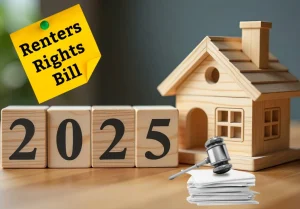The Renters’ Rights Bill has officially received Royal Assent, marking the most significant reform to the private rented sector in a generation.
While the Bill has now become law, the Government has yet to confirm when each part will take effect. For now, it remains business as usual for landlords across England and Wales.
Key Reforms for Landlords
Once implemented, the new Act will bring a wide range of changes, including:
-
Abolition of Section 21 and the introduction of new Section 8 grounds for possession.
-
All tenancies becoming periodic by default (no fixed terms).
-
A requirement for written tenancy agreements.
-
Limits on rent in advance and bans on rental bidding wars.
-
Revised rules on rent increases.
- Strengthened rights to request a pet in the property. Landlords will be able to require pet insurance.
- Landlords and agents will not be able to discriminate against prospective tenants in receipt of benefits or with children.
-
A new Private Rented Sector Database and mandatory Landlord Ombudsman membership.
-
Stronger enforcement powers for local authorities, including civil penalties of up to £40,000.
Some enforcement powers are expected to start within two months, while the major tenancy reforms will follow after the Government confirms the official commencement date.
What Landlords Should Do Now
Landlords are advised to start preparing by:
-
Reviewing and updating property documentation and compliance.
-
Checking that agents and systems are ready for the changes.
-
Ensuring tenant referencing and inspections are up to date.
-
Noting that existing assured shorthold tenancies (ASTs) will automatically convert to periodic tenancies once the Act takes effect.
Once the new rules are implemented, all landlords will need to provide tenants with updated information on the new regime—expected to be made available via GOV.UK.
Future Measures Still to Come
Some reforms will arrive later through secondary legislation, including:
-
The launch of a national landlord ombudsman.
-
Development of a PRS database with landlord registration.
-
Introduction of a Decent Homes Standard in the private sector (target 2036).
-
Awaab’s Law, tackling damp and mould issues (consultation expected soon).
Local authorities will also gain the power to demand evidence of compliance and enter premises without a warrant in specific circumstances.
Support and Guidance
Keep an eye on the Bishop SureLets website and LinkedIn channel for the latest updates and practical advice as the Government confirms implementation details.
Brought to you by Bishop SureLets – Brighton & Hove’s only truly personal letting agent, keeping you informed every step of the way.
If you are looking for a personal letting service for property in Brighton, Hove, Kemptown, Worthing and surrounding areas or if you just have some general queries please feel free to contact us on +44 (0)1273 646426 or [email protected]
Hope you have a great week.

